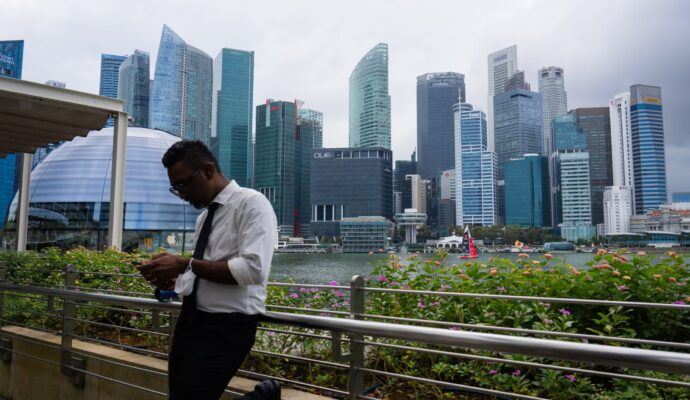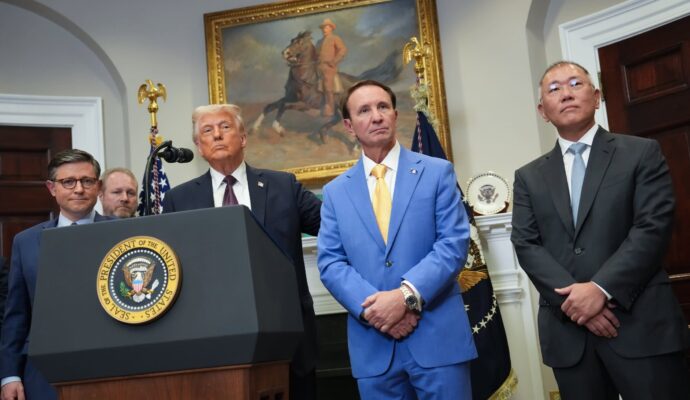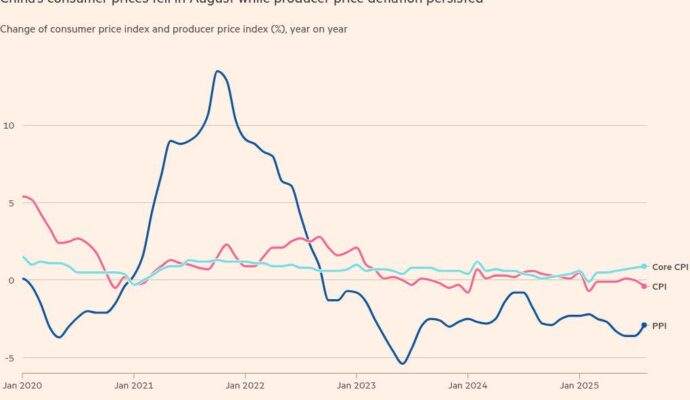
Unlock the Editor’s Digest for free
Roula Khalaf, Editor of the FT, selects her favourite stories in this weekly newsletter.
How do you go from free school meals to riots in the streets? To launch what should be the ultimate in popular public policy, good nutrition for children, and yet have a mob looting your finance minister’s home less than a year later is quite a trick. President Prabowo Subianto has managed it nonetheless. It reflects the idiosyncratic way in which he has led Indonesia’s economy and an urgent need to change direction if his country is to escape a looming middle income trap — or a more immediate economic crisis.
The proximate cause of recent unrest in Indonesia, in which at least eight people died and a regional parliament building was set on fire, was public outrage over generous housing allowances for members of parliament. More fundamentally, however, the protesters were venting unhappiness about their own financial situation, including a lack of job opportunities, a squeeze on middle-class incomes and a feeling that the economy benefits a small class of oligarchs and not the common people.
Such complaints are a long-standing feature of Indonesia’s resource-driven economy, which has reached upper middle-income status with GDP of about $5,000 per capita, but is still far from becoming a rich country. Generous public spending ought to be a good palliative for economic discontent and Prabowo’s plans are certainly expansive: as well as spending $28bn a year on free school meals, he aims to launch up to 80,000 village co-operatives, build 3mn affordable houses and grow his $900bn sovereign wealth fund, Danantara.
Nonetheless, Prabowo’s policies are one root cause of the protests, because of the way he has sought to finance his ambitions. Rather than securing new sources of revenue, the president ordered massive, overnight cuts to ministerial budgets and transfers to regional governments. There was doubtless some waste in those budgets, and in theory, reallocating public spending ought not to have much of a macroeconomic effect, but only if the new spending increases as quickly as the old spending falls. In practice, the free school meal roll out has been troubled — there have been hundreds of cases of food poisoning — while the crackdown on other spending has been abrupt.
The result is a strange combination of populism and severe public austerity. Slash funding for teachers, civil servants and frontline healthcare — with an emphasis on events and business travel — and, predictably enough, you hammer regional tourism and consumption. Slash transfers to local governments and they have to seek funds elsewhere. Indeed, the immediate cause of several of the biggest protests outside of Jakarta is regional governments proposing huge increases in local property taxes. All of the spending cuts have a multiplier effect and leave regular Indonesians with less money in their pockets. Other Prabowo policies such as cracking down on illegal mines and plantations, while worthy in themselves, could damp business activity in the short term.
Prabowo’s apparent response to the unrest will be to ditch the austerity and keep the populism. He has sacked finance minister Sri Mulyani, who served in the role for 14 of the past 20 years — a former managing director of the World Bank, she was a widely respected technocrat, seen by investors as a guarantor of basic economic orthodoxy. Alarmingly for markets, her dismissal came just as Bank Indonesia, the country’s central bank, signed a “burden-sharing” agreement with the government, under which it will help to finance the government’s co-operative and housing projects. This does not mean there will be untoward monetary financing of the government, but it blurs the boundaries of central bank independence in a way that will hurt investor confidence. The rupiah fell by more than 1 per cent on Tuesday.
As a leader in his seventies, who had desired the presidency for decades, Prabowo doubtless feels he must hurry and the shift in public spending should settle down with time. Free school meals are in many ways a laudable policy. Nonetheless, there are grave doubts about whether his broader programme is what Indonesia needs.
In the 1990s, when the country was achieving 8 per cent growth, it was driven by labour-intensive manufacturing. More recently, growth has been stuck around 5 per cent, and manufacturing has gone into reverse, unable to compete with the might of China. This has led to job losses among factory workers, who then fall back into the informal economy. Prabowo aspires to get growth back to 8 per cent, but his vision for how to do so seems entirely state-led, and focused on creating industries downstream from the country’s natural resource production, which are not necessarily the sectors, such as textiles, that create a lot of jobs.
This shift in spending priorities also ends the focus of his predecessor, Joko Widodo, on infrastructure. A tabulation by Citi of new strategic national projects tells the story. For the period 2020-24 they count 53 new toll road projects; for 2025-29 they list four. The picture is similar for ports, railways and irrigation. Good infrastructure is not a sufficient condition for robust private sector growth, but it is a necessary condition.
The fundamentals of Indonesia’s economy are still strong but Prabowo’s plans are not working. He needs to listen, and take the protests as a prompt to think again — while there is still time.


